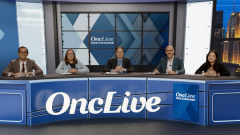
Selecting Therapy for a Real-World Patient With Clear Cell RCC
Centering discussion on a patient scenario of advanced clear cell renal cell carcinoma, panelists reflect on how they would approach selecting first-line therapy.
Episodes in this series

Transcript:
Brian I. Rini, MD:…We talked about all the data first. Now we’re going to the case. I should just note, there were a number of abstracts at ASCO [American Society of Clinical Oncology Annual Meeting] about patients with bone metastasis and liver metastasis. We don’t have time to dive into them, but just for the audience, these are generally retrospective series and case series, but there are some data at ASCO to look at that might be relevant to practice. Now that we’ve laid out the data in our practice, let’s go to this patient case and then we’ll talk a little bit about management. Then we’re going to close [with discussing] the front line. I want to talk about any nivolumab data and then maybe just touch on triplets [therapy], which we already did a little bit.
A patient of mine, a 72-year-old man, comes in with some symptoms. Flank pain. [He] has a rheumatoid arthritis history. He is on low-dose methotrexate, don’t know much more about it at this point in time. But otherwise, a very active, healthy 72-year old. [He] was a fairly heavy smoker but quit upon diagnosis. You see the labs there, normal kidney function, normal to high hemoglobin. Then [he had a] CT scan with a kidney mass; what you’re actually seeing on this scan is the IVC [inferior vena cava] extension. Then [possibly we see] some small lung nodules, too small to characterize, maybe there’s a little something in the liver…. So definite kidney mass consistent with RCC [renal cell carcinoma] and vague other radiographic abnormalities and good performance status, as I mentioned. This patient is thought to have nonmetastatic disease. These radiographic abnormalities are not biopsied but are not worrisome enough. [The patient] undergoes right radical nephrectomy, tumor thrombectomy, has clear cell RCC with some sarcomatoid features, pathologic stage T3B, but otherwise, negative margins and negative nodes as is N0 [no cancer in nearby lymph nodes]. So again, we’re not going to talk about adjuvant therapy, but I can’t help myself. That was March 2019…. Let’s say adjuvant pembrolizumab, that’s why this patient didn’t get adjuvant therapy or one of the reasons, but your answer has to be yes or no, in the interest of time. Would you give this patient adjuvant pembrolizumab now? It’s grade 4 T3B…maybe upwards of 60% risk of recurrence, in a 72-year-old patient. [He] has this rheumatoid arthritis history on methotrexate. Yes or no, adjuvant pembrolizumab?
Bruno R. Bastos, MD: Yes.
Stephanie A. Berg, DO: No….
Eric Jonasch, MD: Yes, I would discuss it….
Brian I. Rini, MD:The patient says “Doc, you’re the expert. You know more about this than I do. I’ll would do whatever you say.”
Bruno R. Bastos, MD: This patient has a very high risk; a lot of the future [is] concerning.
Brian I. Rini, MD:Yes. OK, good. We’re split here. Again, we’re not really talking about adjuvant therapy, but it was too juicy to pass up. But obviously, that history is relevant as we move to this. It’s going to be a frontline case. So, unfortunately, some of the small lung nodules progressed. There’s a new left lower lobe nodule. If you can see on this, there’s now a new left adrenal mass. Let’s say it’s biopsied and consistent with recurrent disease…. So it’s about a year after nephrectomy. Lab [results are] normal, still has good performance status, IMDC [International Metastatic RCC Database Consortium] favorable risk. It was just over a year ago, in part based on the timing of the scan, right? Just the way it happens, this is I guess [during the COVID-19 pandemic], right? So the scans were probably delayed a bit. We observed this patient in part because it was the middle of the pandemic or the first part, I should say. For that reason, and I think because he had low volume disease and favorable risk, we observed this patient initially, but then over the course of the next 6 months [the patient] had further progression. Pretend you don’t read the bottom of that slide, [the patient] has further progression requiring therapy…. Stephanie, we’ll start with you. So you have this [patient with an] ECOG performance status of 1; [the patient] does have rheumatoid arthritis, history on methotrexate but it is well controlled. You talk to the rheumatologist and they say, “It’s well-controlled and I have some other tricks up my sleeve if you need them. Favorable risk with low volume disease but growing, and we’re not going to observe or SBRT [stereotactic body radiation therapy] this patient.” Let’s take that off the table. What would you give this patient?
Stephanie A. Berg, DO: Favorable risk.
Brian I. Rini, MD:Why? Give us a brief fresh note.
Stephanie A. Berg, DO: I would say favorable risk. There’s been a big [discussion at ASCO] about is there really a need for immunotherapy or really going for favorable worse disease? You can just even do TKI [tyrosine kinase inhibitor] monotherapy for these patients. Being an older patient with really good performance status, I think either monotherapy would’ve been appropriate at this point or especially if they can’t utilize any SBRT…. I think it’s appropriate to do the combination. I don’t shy away from autoimmune disease, even though those patients were included on clinical trials, but a [patient with] well-controlled rheumatoid arthritis and a good rheumatologist….
Brian I. Rini, MD:It’s not an absolute contradict.
Stephanie A. Berg, DO: Correct. I would feel comfortable giving them either monotherapy with TKI and adding in…
Brian I. Rini, MD:Probably IO/TKI [immuno-oncology/tyrosine kinase inhibitor].
Stephanie A. Berg, DO: IO/TKI, correct.
Brian I. Rini, MD:OK. Eric.
Eric Jonasch, MD: The thing that worries me about this patient is you did say he had sarcomatoid features in his primary.
Brian I. Rini, MD:I did, in the primary.
Eric Jonasch, MD: Favorable risks aren’t created equal. This is an example, I think, of an individual who, although they are now starting to progress, they are “favorable risk,” but I’m concerned about the histology and I would give something containing a PD-1. I think you just work very closely with a rheumatologist in terms of managing whatever toxicities you arise. I would not give this patient ipilimumab [plus] nivolumab because…I think that would be a bridge too far from a toxicity perspective.
Brian I. Rini, MD:I agree. So IO/TKI?
Eric Jonasch, MD: Yes.
Brian I. Rini, MD:OK. I agree. I’m not trying to give ipilimumab to a patient with rheumatoid arthritis on methotrexate. I think that just, as you say, a bridge too far…. This was my patient, so I gave him axitinib [plus] pembrolizumab in part based on the timing of this. But before we go to back to the case, Dr Berg, what would you do?
Stephanie A. Berg, DO: I would do axitinib [plus] pembrolizumab also. I think the reason I said no to adjuvant is because this was so likely to happen. He was so high risk for metastasis…. I think if you’re going to give IO, you’re going to give it once. They have rheumatoid arthritis, you’re going to learn what they have. Now’s the time to give it, not later. It’s unlikely that someone would go through therapy and never see an IO because of rheumatoid arthritis. So I think you bite the bullet at this point. And axitinib [plus] pembrolizumab for favorable risk is what I would do.
Brian I. Rini, MD:OK. Sounds good. Bruno?
Bruno R. Bastos, MD: I agree with the IO-TKI. IO-IO I would not give it, based on the history of rheumatoid arthritis. It sounds as though it’s well-controlled with the rheumatologist. I agree with the axitinib [plus] pembrolizumab choice. I would choose the same.
Transcript edited for clarity.









































